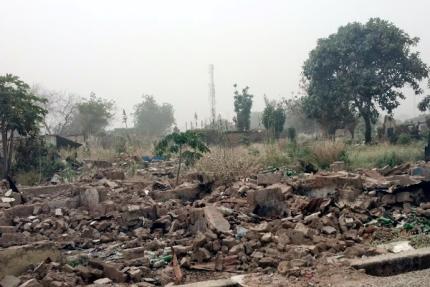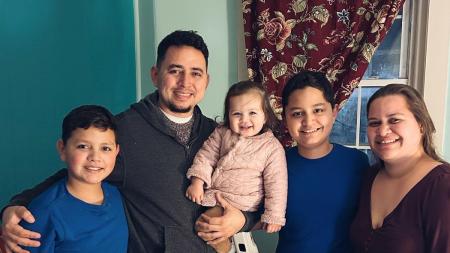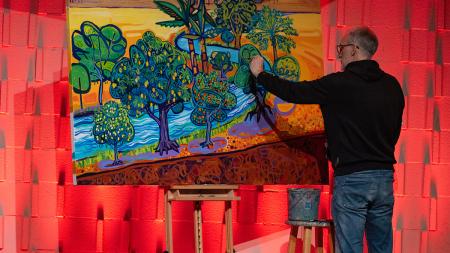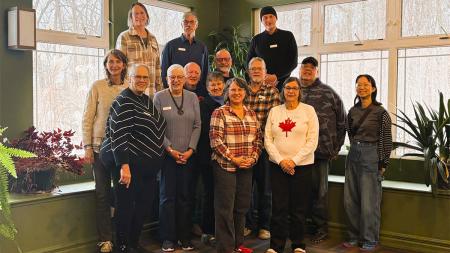CRC Evaluating Next Steps in Peace Process

The results of an uprising in Wukari
Peter Vander Meulen
The Christian Reformed Church Synod 2014 was meeting in Pella, Iowa when it learned that a dispute over a phone recharge card had broken out in violence, leaving 100 people dead and hundreds of buildings destroyed in the town of Wukari, Nigeria.
“We learned that our brothers and sisters of the Christian Reformed Church of Nigeria (CRCN) had suffered many dead and significant destruction of property,” says Peter Vander Meulen, director of the C RC’s Office of Social Justice, adding that the CRCN is based in Wukari.
After hearing what happened, the CRC synod passed a resolution of support for its sister church in Nigeria and two other Reformed churches in the area.
The CRC also asked the Peace, Justice, and Reconciliation Committee (PJRC), a Nigerian group instrumental in bringing peace to the Nigerian city of Takum in the early 2000s, to evaluate the situation.
The PJRC did that and made a formal request for assistance from the CRC, which sent Vander Meulen in mid-December to further investigate the conflict.
During a several-day visit, he consulted with leaders from the three Reformed churches and other leaders in the area. Besides the CRCN, the other Reformed churches are the Universal Reformed Christian Church (NKST) and the Reformed Church of Christ in Nigeria (RCCN). Representatives from these churches make up the PJRC.
“There are many Reformed Christians in this area with whom the CRC has long relations, and the churches can play an essential role in working for peace,” says Vander Meulen.
Wukari, a town of about 240,000 people, has been the epicenter of growing violent conflict among Christians, Traditionalists, Muslims, nomadic Fulani, and the several dominant ethnic groups in Taraba and Benue — states with large concentrations of CRC-related churches — over the past few years.
While there, Vander Meulen was disturbed to see the widespread results of the conflicts in Wukari, located in northeastern Nigeria. But he also gained insight into the complex nature of the fighting.
“The violence is partly over religious differences, but ethnic splits within ethnic groups, ancient rivalries between farmers and pastoralists, and present day high-stakes politics play into this, too,” he says.
“Existing unresolved conflicts at local levels are being easily exploited by larger, national and regional extremists groups such as Boko Haram. If you wish to destabilize an entire region - or a country - you look for the fault lines that already exist.”
There is not just one conflict in Taraba and Benue states, there are many - and local leaders are concerned that things could get much worse if a full-blown “arms race” between local ethnic and religious groups develops.
Vander Muelen says the PJRC has specifically asked if Dr. Hizkias Assefa, a well-respected Mennonite peace mediator who has worked in the past with the CRC, could now be sent to the region to evaluate the situation.
Assefa played an important role in The Takum Peace Process, begun in the 1990s and culminating in the 2006 Peace Agreement, which was supported by five mission organizations related to the then Reformed Ecumenical Council and the CRC. Takum is located in the same region as Wukari.
“We were deeply involved in working for peace at that time, and Hizkias was key in building trust between the groups,” says Vander Meulen.
The PJRC and the local peace committees that emerged from this peace process are asking Assefa to return because people there trust him and the earlier process was effective, says Vander Meulen. “The areas and towns that embraced peace in the early 2000s have been relatively calm and secure through all of this.”
But the present situation is much more complicated. Given all that has happened, Vander Meulen says finding a way to peace wouldn’t be easy.
“The church leaders with whom I talked truly seem to have highly conflicting emotions and responses to the past few years of conflict,” he writes in a report about his trip in December.
“Many have buried way too many church members killed in these clashes--including several senior denominational leaders.”
The CRC’s Ministries Leadership Council, at the request of Vander Meulen, has set up an ad hoc planning and implementation group.
The group includes representatives from OSJ, World Renew, Christian Reformed World Missions, and the three Reformed churches represented by the Peace, Justice, and Reconciliation Committee.
A goal of this ad hoc committee is to support a visit by Assefa to the area in early May, and if there are then additional steps to be taken, to take them, says Vander Meulen.
Such steps could include raising funds to pay for ongoing work toward peace, making the CRC members more aware of issues facing Reformed Christians in Nigeria, and developing partnerships with other groups interested in working on peace for Wukari.
Meanwhile, Rev. Peter Borgdorff, chief ecumenical officer for the CRC, has sent a letter to the World Communion of Reformed Churches to say that the CRC has “offered advice and encouragement to our brothers and sisters in Nigeria who live daily surrounded by conflict and violence. . . . The assessment of how best to support the peace initiative will remain an urgent matter for us in the days ahead.”


